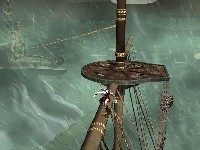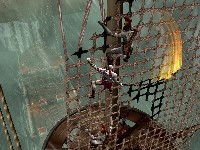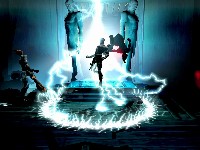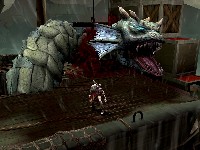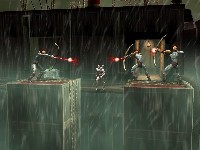Genre: Action
Publisher: SCEA
Developer: SCEA
Release Date: March 22, 2005
Buy 'GOD OF WAR': PlayStation 2
When I mention God of War, the first question people ask me is always, "Is it as good as the hype?" To truthfully answer the question, you have to explain a few things, the first being that God of War is a gruesome game in which you are required to inflict your evil will on countless amounts of undead, and even human, foes. Things are sounding good so far, but there is a catch. The second thing is that the ESRB label reads as long as a Christmas list, with items such as gruesome violence, blood and gore, nudity, and sexual themes, but I truly feel they forgot to warn that this game is only as good as the hype when taken in small doses. High quality game as it may be, God of War is not a title that you can sit down with for three to four hours at a time because God of War gives you too much, too fast. Ultimately, however, the game is as good as the hype.
The opening sequence gives you a short glimpse into the future: Kratos, our evil, yet identifiable un-hero, hurls himself off of the highest mountain in Athens, claming that his gods have abandoned him, giving you a short taste of the end of this story of bloodlust and revenge, while leaving you wondering about the cause. You later find that Aries, god of war and son of Zeus, has taken physical form and is quickly bringing hell on his sister Athena’s beloved city of Athens. Kratos, being the only mortal strong enough to defeat a god, has been charged with the task of doing so, with the reward of relieving his mind of his mysterious past.
Actual gameplay takes place three weeks in the past, on a half-sunken ghost ship. The game starts off strong, hurling hordes of baddies into your path, only to be slaughtered by your blades. The controls are very easy to master, giving you the ability to brutalize and murder your opponents in the sickest fashion. This game is really a button-masher's dream due to the fact that dealing out 40- and 50-hit combos right from the get-go is no problem. These combos can be built upon with an experience system, along with your other weapons and magical abilities.
As mentioned before, the controls are quite simple. Your face buttons control your quick, strong, and grab attacks as well as jumping, and the shoulder buttons handle your blocking, dashing, and magic activation. During the first five to 10 minutes of the game, you’ll either be screaming at the top of your lungs or just plain awestruck by how intense and fun the game can be.
The majority of this game is spent dicing enemies with two of the coolest weapons that I have ever seen in a game. Kratos wields two half-swords that he controls by hurling them with attached chains. Infused by the gods, these blades have the ability to create molten lava or fire at the finale of a rush of cuts and slashes. Near the midpoint of the game, you will uncover the Blade of Artemis, a rather large sword that would remind you of the sword held by a character named Cloud. The Blade of Artemis is one of the few secondary weapons in a game that actually could take over as the most used weapon. The giant blade has the ability to split enemies right down the center, horizontally or vertically. The blade’s only drawback is the fact that you don’t get a very cinematic fatality.
Sure, you can cut an enemy in half, but that’s been done by too many games. With the dual half-blades, you can use the circle button in conjunction with any face button to engage a grab fatality. The fatalities are very brutal and very quick, but this was the part of the game that I was talking about when I said that it wears thin fast if you play it too long. You have immediate access to all the fatalities right off the bat. As good as they are, if you are anything like me, then you try to end every enemy in the most ghastly manner imaginable. Doing this every time you have an enemy lobbed at you gets a bit old too fast. However, if used a bit more sparingly, it could make the game near perfect.
To be fair, SCEA did give a break from the same old fatalities every once in a while, with special fatalities for the bigger adversaries, by either mashing the circle button to fight a blade down the throat of a giant minotaur or by pushing face buttons as they appear on screen to dodge a cyclops’ attacks and jabbing your swords into his skull. These fatalities, coupled with the boss battles, may very well be the reason I played the game all of the way through. Five minutes into the game, you’re already launched into your first boss battle. While the first part of boss battles is your basic hack, slash, and block, the latter half are played by pushing context-sensitive buttons in order to create quite the cinematic battle sequence. I read an interview in which one of the developers revealed that the game's engine has been in the works for a little over five years, and I have to say that it shows. The game flows fluidly from one piece to the next, with only cut scenes breaking up the action. Throughout the duration of the game, I can only recall a total of two load points
The action in God of War is good ... great even. However, no action game would be truly complete without at least a hint of puzzle solving, and God of War does an amazing job of seamlessly blending both elements into a neat little package. The puzzles don’t feel like a cheap attempt to throw in some puzzles to break up the action sequences, and they actually fit in well with the trials and tribulations of the Greek gods. At one point, in order to progress through the temple of Hades, you must first rescue a captured Spartan only to maneuver his holding chamber into a sacrificial room and place it in between two walls of flame. Deadly traps of this nature are littered throughout the puzzles, making them quite enjoyable while usually fighting off a decent amount of undead forces.
The game boasts above-average visuals that keep you pulled into the Greek world and culture. There are many games out there today that cut corners and make things look good from afar but less than stellar when viewed up close. God of War is not one of those titles. I am one of those gamers who will explore every little inch of an environment before moving on and am pleased to say that during the entirety of God of War, I was not able to find one instance of that nature. The developers did an amazing job of putting detail on the right objects, based on what parts of a level you can access with Kratos as well as the camera angles, which also make a great contribution to the atmosphere. Using techniques that are taken straight out of any good action movie, the camera angles are unique and well thought-out.
The Greek atmosphere is held together quite well by the gameplay, characters, and graphics, but the icing on the cake is the amazing soundtrack. I truly believe the God of War has one of the top five soundtracks of any game within the past year. Many titles make half-hearted attempts and creating epic scores to go along with the mood of their game. God of War is one of the few titles to actually accomplish the job and do so with such elegance. Several titles have offered up their soundtracks on CD, and I have very rarely ever taken such an interest in a game's soundtrack, but I would actually purchase the God of War soundtrack, if it weren't already free. SCEA made a very generous choice to make available a free download of the entire soundtrack via a key on the back of your instruction manual.
God of War, quite obviously, has no multiplayer mode; it’s just not a game that would work well with another Kratos running around. I found much solace in the sheer amount of extra content both on the disc and online that would fill that small void. By defeating the game on various difficulties, you will gain access to many unlockables, which are clearly stated in the back of your instruction manual. Treasures such as back stories of Kratos’ family, glimpses into the future, literature on the monsters, gods, and ancient Greece are all actually very interesting items, but one of the best unlockable items in any game ever is the addition of deleted levels. Showing deleted levels that didn’t make it into the game is a very novel idea. I think a lot more games should do this in order to give you a window into the game development process so we can see why things do and don’t make it into the game, due to story or time constraints.
 With high quality gameplay, flashy graphics, and an impressive soundtrack, God of War is one of the better action games to come out in a long time, and its originality and flat-out style is enough to make a great addition to any gamer's collection. The blood, gore, and blatant nudity will be enough to attract any mature gamer, but the action and detailed storyline will keep any gamer addicted.
With high quality gameplay, flashy graphics, and an impressive soundtrack, God of War is one of the better action games to come out in a long time, and its originality and flat-out style is enough to make a great addition to any gamer's collection. The blood, gore, and blatant nudity will be enough to attract any mature gamer, but the action and detailed storyline will keep any gamer addicted.
Score 9.5/10
More articles about God Of War (2005)













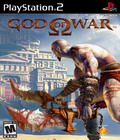 God Of War makes powerful use of the darkly imaginative world of Ancient Greek mythology, where the realms of the mortal and the divine collide in a pervasive atmosphere of brute force and violence. Playing as Kratos, throughout the game players will wield double blades bound to his body by long chains, weapons symbolic of this vicious world to which he is bound and the fate from which he seeks to escape.
God Of War makes powerful use of the darkly imaginative world of Ancient Greek mythology, where the realms of the mortal and the divine collide in a pervasive atmosphere of brute force and violence. Playing as Kratos, throughout the game players will wield double blades bound to his body by long chains, weapons symbolic of this vicious world to which he is bound and the fate from which he seeks to escape.

















